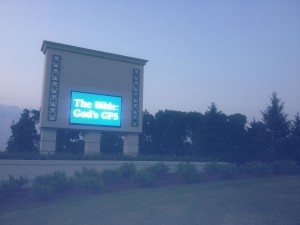Engaging a Storied Text
Long before smartphones were the standard cell phone, I enjoyed the navigator feature on my dumb phone. GPS is helpful because it is straight-forward; it tells me what I need to know to get me from point “A” to point “B.” Tonight, I stumbled upon a different category of navigation systems. A well to-do church advertised this to every passerby on their marquee:
Though a bit confused at first regarding why God would need a GPS, I think I know what this church was trying to get at: “The Bible: The Church’s GPS.” (I am going to assume for the rest of the post that this is what they meant.) This would mean, that Scripture tells us where to go; when to turn left, when to turn right, when the figurative next coffee shop is five miles away, etc. etc.
This all sounds well and nice until one actually begins to read the thing.
Scripture is simply not that straight-forward. The Bible is full of lot stories. Stories and storied lives do not give us propositions. Think about your own life and the stories embedded within it. Yes, sometime there is a clear moral to the story, but more often than not our stories are complex and far from clear-cut.
Reading stories gives us alternative horizons for viewing our world, ourselves and our Creator God. Stories challenge our assumptions, baffle us, spark hope in us when all seems lost, says in winding prose what cannot be said in clear statements (alas, the Book of Proverbs does not and cannot say all there is to know about living a life of wisdom). Stories are messy, just like us. Stories are located and perspectival, just like us.
The biblical stories provide us with a framework for understanding who we are and who our Creator God is.
Sadly, by making Scripture a navigational tool, I believe that incidentally (and accidentally) the authority of Scripture is being undercut. When we remove Scripture from the living and active work of the Triune God, we reduce the text to simply words on a page. It runs that danger of becoming another tool for propaganda. It loses its edge to challenge, shape and transform the reader in a way that no other text can. It is like taking the helium out of a balloon and then demanding it to float.
Having recently returned to the US after living in Canada, I have been reminded of how easy it is to make Scripture a tool for our own agendas. If we approach Scripture simply as dos and don’ts — as a navigation system which makes issues of morality clear-cut without any dissonance — then I fear we miss the richness of the storied character of the Triune God evidenced through Scripture.
Hans-Georg Gadamer talks about the fusing of horizons: the place where our own horizon is stretched and shaped by another’s horizons. There is never a point within our consciousness when we cease fusing our horizons with outside horizons. For some time now, I have found it incredibly helpful to articulate our reading of Scripture as a fusion of horizons. The stories contained within Scripture offer new narratives which transform how we see our world, our Creator and ourselves. And the beauty of all this is that this fusing is ongoing. There is never a point, I believe, when I can set down my Bible and assert that I have received all the information I need from it. This fusing of horizons is offered to us as a means of God continually speaking, challenging, affirming, rebuking and demonstrating who He is and who we are in Him.
Rachel
Latest posts by Rachel (see all)
- On Fairy Stories - October 20, 2016
- Are Women Human? - August 15, 2016
- The Nicene Creed: “…who spoke by the prophets.” - July 11, 2016

